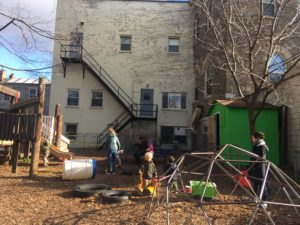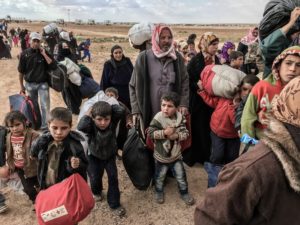With gratitude, and looking forward
A s this year comes to an end and we look forward to the new year, we are grateful for the outpouring of local support received in response to challenges directly affecting refugees and immigrants here in Ithaca.
s this year comes to an end and we look forward to the new year, we are grateful for the outpouring of local support received in response to challenges directly affecting refugees and immigrants here in Ithaca.
We have reached out to our newest neighbors who have come from all over the world—Afghanistan, Vietnam, Colombia, Venezuela, Iraq, Saudi Arabia, Burma/Karen community, China, Ecuador, Indonesia, Japan, Taiwan, and Romania.
In 2017, IWR served newly arrived refugees, supported at-risk immigrants, and welcomed newcomers in our community through two major initiatives: Response Projects and Global Roots Play School.
Response Projects
IWR Response Projects focus on responding to the specialized needs of both newly arrived refugee families and at-risk immigrants who have lived in the Ithaca area for a longer period. With their agreement, we build a small core welcoming group that accompanies a family or individual in taking steps toward self-sufficiency.
While one family may need support to connect their child to meaningful activities, another might need transportation training, computer help, or assistance with finding consistent food support. Others need help finding people in the community who speak their language. Some need all of the above and more. Response Projects reduce isolation and get people connected to the wider network of resources that Ithaca offers.
We see that addressing near-term needs can have a long-term impact—these small investments into some of our most vulnerable neighbors lead to ever larger steps toward stability, success, and new hope for each person.
Global Roots Play School
Thanks to our entire community, we launched Global Roots Play School four months ago. Real families in our community now have access to English language education and tutoring and thoughtful, high-quality care for their children that was not accessible just a few short months ago.
Twenty-one children have been part of the program so far, and we have 13 more children on the waiting list!
Global Roots is already making a difference by offering a unique place that closes a gap for parents—especially women—who are eager to learn English but would otherwise not be able to due to lack of nearby childcare.
Mothers are often the primary caretakers, and outside childcare can be an expensive and unrealistic expense. GRPS makes it feasible for mothers to get to English class, empowering them to seek opportunities for themselves, including employment.
Global Roots is an amazing place of welcome. Parents who aren’t quite ready to say goodbye at the door are invited to come and stay. Families connect to other families undertaking the same journey, forming a learning-based community of support where everyone is comfortable and respectful of diverse life experience.
We’ve had parents, grandparents, big brothers, and big sisters all come to play. And the friendly faces that grace our door say daily “you are welcome here” in a profound way.
IWR Response Projects and Global Roots are just two examples of the ways IWR is working toward a more inclusive and welcoming community.
Your support—in volunteer hours, donations, goods and services, and by simply showing up to IWR events—is of absolute importance. We could not undertake these initiatives, and respond to the changing needs of newcomers in our community, without your support.
Please consider giving a holiday or end of year gift today. You also have the option to set up a recurring gift. Help this meaningful work continue in our community!


